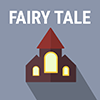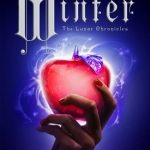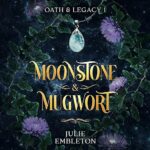
Gilded by Marissa Meyer is the first in an as yet untitled series or trilogy and a haunting retelling of Rumpelstiltskin. Addictive, dark, and romantic, this fairytale will sweep you away and have you checking the phases of the moon.

by Marissa Meyer
Genres: Fantasy
Source: Publisher
Purchase*: Amazon | Audible *affiliate
Rating:




Heat Level:



Long ago cursed by the god of lies, a poor miller's daughter has developed a talent for spinning stories that are fantastical and spellbinding and entirely untrue.
Or so everyone believes.
When one of Serilda's outlandish tales draws the attention of the sinister Erlking and his undead hunters, she finds herself swept away into a grim world where ghouls and phantoms prowl the earth and hollow-eyed ravens track her every move. The king orders Serilda to complete the impossible task of spinning straw into gold, or be killed for telling falsehoods. In her desperation, Serilda unwittingly summons a mysterious boy to her aid. He agrees to help her… for a price. Love isn't meant to be part of the bargain.
Soon Serilda realizes that there is more than one secret hidden in the castle walls, including an ancient curse that must be broken if she hopes to end the tyranny of the king and his wild hunt forever.
I love slipping into the worlds Meyer creates and while I am familiar with the story of Rumpelstiltskin; she put a spin on it that drew me in. Fans of German folklore will appreciate the research Meyer did in bringing Grimm’s Rumplestiltskin’s tale to life, but also the stories of the Erlking, Shrub Grandmother and Nachtkrapp.
Serilda lives with her father, the local miller, and has golden wheeled eyes that make the villagers blame her for all their woes. She has a talent for weaving stories. Most of the village fear her, but the children adore her and the stories she weaves about the Erkling, woods and creatures found there. She received her gift from the god Wyrdith and we learn how that came to be in the opening chapter.
The townsfolk avoid the forest and live in fear of the full-moon when Erkling and his dead hunt. They are known for stealing young children and hunting wild creatures. I loved the Wild Hunt and the ghosts, slaves and happenings within the Erkling’s keep. Meyer’s weaved elements a horror into this dark fable from the creatures to the poor souls who heard the call.
On a full moon Serilda saves some moss maidens and when confronted by the Erkling, she weaves a tale of spinning straw into gold. On the next full moon, the Erkling sends one of his servants to her door and she is taken to Adalheid Castle, which sits in the middle of a lake. The Erkling throws her in a dungeon filled with straw and a spinning wheel. She must weave all the straw to gold before daylight. Weeping Serilda believes she will face death, but a young man, a poltergeist, named Gild appears. If she gifts him her locket, he will help her.
The tale that unfolds was a gothic fairytale filled with horror, romance and magical elements from the creatures to the lores. I was impressed with how she blended Grimms’ tale with German folklore and loved everything from the hunt to the castle and its secrets.
Aschen Wood, the magical creatures, the secrets and superstitious rituals performed by townsfolk, held me spellbound. Gild (Rumplestiltskin) and Serilda along with secondary characters were fleshed out yet mysterious, and I loved what tidbits we learned. The ship (romance) was sweet, despite the limitations, but the what-ifs will hook you.
The mysteries of Gild, Adaheid castle, its former residence and the Erlking have me anxious for the next book.
Excerpt
All right. I will tell you the tale, how it happened in truth.
The first thing you ought to know is that it wasn’t my father’s fault. Not the bad luck, not the lies. Certainly not the curse. I know some will try to blame him, but he had little to do with it.
And I want to be clear that it wasn’t entirely my fault, either. Not the bad luck, not the lies. Certainly not the curse.
Well.
Maybe some of the lies.
But I should start at the beginning. The true beginning.
Our story began on the winter solstice nineteen years ago, during a rare Endless Moon.
Or, I should say, the true beginning was in the beforetimes, when monsters roamed freely outside the veil that now separates them from mortals, and demons sometimes fell in love.
But for our purposes, it started during that Endless Moon. The sky was slate gray and a blizzard was being heralded across the land by the chilling howls of the hounds, the thunder of hooves. The wild hunt had emerged, but this year they were not only seeking lost souls and aimless drunkards and naughty children who had risked misbehaving at a most inopportune time. This year was different, for an Endless Moon only occurs when the winter solstice coincides with a bright moon in all its fullness. This is the only night when the great gods are forced to take their beastly forms. Enormous. Powerful. Almost impossible to catch.
But if you should be lucky enough, or skilled enough, to capture such a prize, the god will be forced to grant a wish.
It was this wish the Erlking sought that fateful night. His hounds howled and burned as they chased down one of the monstrous creatures. The Erlking himself shot the arrow that pierced the beast’s massive golden wing. He was sure the wish would be his.
But with remarkable strength and grace, the beast, although wounded, was able to break through the circle of hounds. It fled, deep into the Aschen Wood. The hunters again made chase, but too late. The monster was gone, and with sunlight nearing, the hunt was forced to retreat behind the veil.
As morning light shimmered off a blanket of snow, it so happened that a young miller arose early to check on the river that turned his waterwheel, concerned that it would soon freeze over in the winter cold. That is when he spied the monster, hidden in the shadows of the wheel. It might have been dying, if gods could die. It had grown weak. The gold-tipped arrow still jutted from between bloodied feathers.
The miller, cautious and afraid but courageous all the same, approached the beast and, with much effort, snapped the arrow in two and pulled it free. No sooner had he done so than the beast transformed into the god of stories. Expressing much gratitude for the miller’s help, they offered to grant a single wish.
The miller thought on this for a long while, until finally he confessed that he had recently fallen in love with a maiden from the village, a girl who was both warm of heart and free of spirit. He wished that the god would grant them a child, one who was healthy and strong.
The god bowed, and said it was to be.
By the following winter solstice, the miller had married the village maiden and together they brought a baby girl into the world. She was indeed healthy and strong, and in that, the god of stories had granted the wish precisely as requested.
But there are two sides to every story. The hero and the villain. The dark and the light. The blessing and the curse. And what the miller had not understood is that the god of stories is also the god of lies.
A trickster god.
Having been blessed by such a godparent, the child was forever marked with untrustworthy eyes—pitch-black irises, each overlaid by a golden wheel with eight tiny golden spokes. The wheel of fate and fortune, which, if you are wise, you know is the greatest deception of all.
Such a peculiar gaze ensured that all who saw her would know she had been touched by old magic. As she grew, the child was often shunned by the suspicious villagers for her strange gaze and the bouts of misfortune that seemed to follow in her wake. Terrible storms in the winter. Droughts in the summer. Diseased crops and missing livestock. And her mother vanishing in the night with no explanation.
These and all manner of horrible things for which blame could easily be thrust onto the peculiar, motherless child with the unholy eyes.
Perhaps most condemning of all was the habit she developed as soon as she learned her first words. When she talked, she could hardly keep herself from telling the most outlandish tales, as though her tongue could not tell the difference between truth and falsehoods. She began to trade in stories and lies herself, and while the other children delighted in her tales—so full of whimsy and enchantment—the elders knew better.
She was blasphemous, they said. A most despicable liar, which everyone knows is nearly as bad as being a murderer or the sort of person who repeatedly invites themselves over for a pint of ale but never repays the favor.
In a word, the child was cursed, and everyone knew it.
And now that I’ve told the story, I fear I may have misled you before.
In hindsight, perhaps it was a bit my father’s fault. Perhaps he should have known better than to accept a wish from a god.
After all … wouldn’t you?
New Year’s Day
THESNOWMOON
Chapter 1
Madam Sauer was a witch. A real witch—not the way some petty people use the word to describe an unlikeable woman with a haggard appearance, though she was that, too. No, Serilda was convinced Madam Sauer was hiding ancient powers and enjoyed communion with the field spirits in the darkness of each new moon.
She had little evidence. Just a hunch, really. But what else could the old teacher be, with that surly disposition and those yellowish, slightly pointed teeth? (Truly—look closer, they have an unmistakable needlelike quality to them, at least when the light hits them in a certain way, or when she is complaining about her flock of wretched schoolchildren again.) The townspeople might insist on blaming Serilda for every tiny misfortune that befell them, but she knew better. If anyone was to blame, it was Madam Sauer.
She probably crafted potions from toenails and had an alpine newt for a familiar. Icky, slimy things. It would fit her temperament just right.
No, no, no. She didn’t mean that. Serilda was fond of the alpine newt. She would never wish such a horrible thing upon them as being spiritually attached to this abhorrent human.
“Serilda,” said Madam Sauer, with her favorite scowl. At least, Serilda had to assume she was wearing her favorite scowl. She couldn’t actually see the witch while her eyes were demurely lowered toward the dirt floor of the schoolhouse.
“You are not,” the woman continued, her words slow and sharp, “the godchild of Wyrdith. Or any of the old gods, for that matter. Your father may be a respected and honorable man, but he did not rescue a mythical beast who had been wounded by the wild hunt! These things you tell the children, they are … they are…”
Preposterous?
Absurd?
Sort of amusing?
“Wicked!” Madam Sauer blurted, with bits of spittle flying onto Serilda’s cheek. “What does it teach them, to believe that you are special? That your stories are a god’s gift, when we should be instilling them with virtues of honesty and humility. An hour spent listening to you and you’ve managed to tarnish everything I’ve striven for all year!”
Serilda screwed her mouth to one side and waited a beat. When it seemed that Madam Sauer had run out of accusations, she opened her mouth and inhaled deeply, prepared to defend herself—it had only been a story after all, and what did Madam Sauer know of it? Maybe her father really had rescued the god of lies on the winter solstice. He had told her the story himself when she was younger, and she had checked the astronomy charts. It had been an Endless Moon that year—as it would be again this coming winter.
But that was nearly an entire year away. An entire year to dream up delectable, fanciful tales to awe and frighten the little goslings who were forced to attend this soulless school.
Poor things.
“Madam Sauer—”
“Not a word!”
Serilda’s mouth slammed shut.
“I have heard enough out of that blasphemous mouth of yours to last a lifetime,” roared the witch, before releasing a frustrated huff. “Would that the gods had saved me from such a pupil.”
Serilda cleared her throat and tried to continue with a quiet, sensible tone. “I am not precisely a pupil anymore. Though you seem to forget that I volunteer my time here. I’m more of an assistant than a student. And … you must find some value in my presence, as you haven’t told me to stop coming. Yet?”
She dared to lift her gaze, smiling hopefully.
She had no love for the witch, and was well aware that Madam Sauer had no love for her. But visiting with the schoolchildren, helping them with their work—telling them stories when Madam Sauer wasn’t listening—these were some of the few things that brought her joy. If Madam Sauer did tell her to stop coming, she would be devastated. The children, all five of them, were the only people in this town who didn’t look at Serilda like she was a blight on their otherwise respectable community.
In fact, they were the few who regularly dared to look at Serilda at all. The golden spokes radiating across her gaze made most people uncomfortable. She had sometimes wondered if the god chose to mark her irises because you’re not supposed to be able to look someone in the eye when you’re lying to them. But Serilda had never had any trouble holding someone’s gaze, whether she was lying or not. It was everyone else in this town who struggled to hold hers.
Except the children.
She couldn’t leave. She needed them. She liked to think they might need her back.
Plus, if Madam Sauer did send her away, it would mean that she would be forced to get a job in town, and to her knowledge, the only available work was … spinning.
Blech.
But Madam Sauer’s expression was solemn. Cold. Even bordering on angry. The skin under her left eye was twitching, a sure sign that Serilda had crossed a line.
With a whip of her hand, Madam Sauer grabbed the willow branch she kept on her desk and held it up.
Serilda shrank back, an instinct that lingered from all the years she had been one of the school’s pupils. She hadn’t had the backs of her hands struck in years, but she still felt the ghost of the stinging branch whenever she saw it. She still remembered the words she’d been told to repeat with every swish of the branch.
Lying is evil.
Lying is the work of demons.
My stories are lies, therefore I am a liar.
It might not have been so awful, except that when people didn’t trust you to tell the truth, they inevitably stopped trusting you in other matters as well. They didn’t trust you not to steal from them. They didn’t trust you not to cheat. They didn’t believe you could be responsible or thoughtful. It tarnished all elements of your reputation, in a way that Serilda found remarkably unfair.
Copyright © 2021 by Rampion Books, Inc.

Stay Caffeinated!
Never miss a post by adding Caffeinated to your Inbox























Lisa Mandina (Lisa Loves Literature)
I always say that I wasn’t that impressed with the Cinder series, never made it past the second book. But I liked the author’s recent contemporary story. This one also sounds really good, and of course another gorgeous cover. I’ll have to give it a try if I get the time! Great review!
Jen at Introverted Reader
My hold on the audiobook just came available last night. I love Rebecca Soler as a narrator and she reads all of Meyer’s books as far as I know. I’ve listened to every book that I’ve gotten to so far. I’m glad to know you liked it!
Katherine
I read the first too in the Lunar Chronicles series but somehow never quite finished it even though I really enjoyed the first two books. This sounds like another interesting spin on a fairy tale.
Sophia Rose
Loved her older fairytale books and look forward to this darker one. Fab review, Kimberly!
Anne - Books of My Heart
I haven’t read this author yet but I have wanted to read her books. She seems to do a lot with fairy tale retellings.